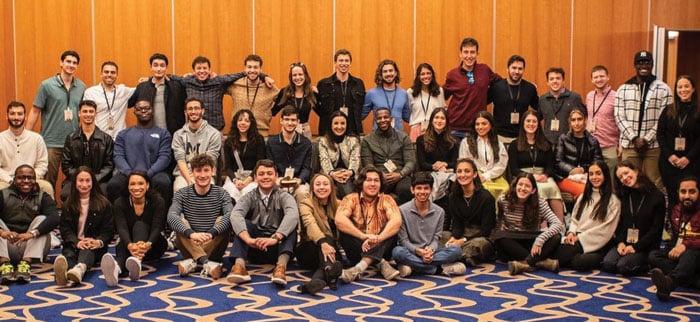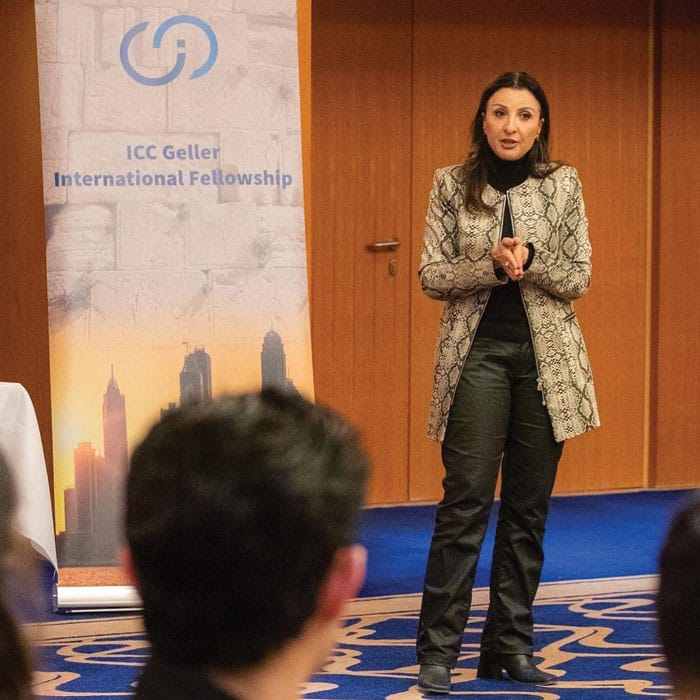 The 40 college students in the ICC’s Geller International Fellowship in Jerusalem. Photo Courtesy of the ICC.
The 40 college students in the ICC’s Geller International Fellowship in Jerusalem. Photo Courtesy of the ICC. Brandon Takavoli, 20, will never forget a story his relative told him about what happened to her in a grocery store in Tehran.
“My grandmother said she grabbed a cucumber in her hand and the clerk said ‘don’t touch that you dirty jew you’re going to contaminate that cucumber for the rest of us,” Takavoli told the Journal from Jerusalem.
Takavoli, a sophomore at the University of Southern California, and a graduate of Milken Community School in Los Angeles, is in Israel with about 40 college students from across America as part of the Geller International Fellowship, a trip from January 2-13 that will include a visit to the United Arab Emirates. The trip required three rounds to be accepted as is under the auspices of Israel on Campus Coalition, known as ICC.
Takavoli said on the trip so far, he has spoken to Israelis in East Jerusalem and representatives of the Palestinian community in the West Bank.
“I think it’s important to make that human-to-human connection,” he said.
He explained that his family left Iran for Los Angeles for freedom.
“The fight is in my bones for a long time,” he said.
He explained that he works on his campus to fight against the Boycott Divest and Sanctions movement known as BDS.

Photo courtesy of the ICC.
“The anti-Israel campaign at USC is subtle,” he said. “USC’s anti-Israel campaign is subtle. We don’t have an apartheid wall and in-your-face stuff like UC Berkeley. Our institutions have anti-Israel bias. Our student government avoids conversations about Israel because pro-Israel students in our student Senate don’t want to open a can of worms. The best example I can give you is the student newspaper had an article by the editorial board about the administration’s failure to take measures against Greek fraternity life to protect women. Right at the end, out of nowhere, it included a sentence that said this is the exact same thing how administrators don’t take a stand on the Israeli-Palestinian conflict. No connection at all. But they just throw it in there. It triggers people and gets people annoyed.”
Lauren Samidi, 22, said that growing up in a tight-knit Persian Jewish family in Beverly Hills, she hadn’t seen antisemitism until the Chabad menorah was vandalized at San Diego State University, where she is a senior. Samidi said things are generally okay at her school.
Jacob Baime, Chief Executive Officer of the Washington, D.C based Israel on Campus, said the idea was to have a national trip for elite students exemplifying leadership qualities.
“We have to engage people today who will be leaders tomorrow,” he said, of the group which included Christian students.
Baime said that anti-Israel groups on colleges were “investing so heavily in campus because they believe the path to ending U.S. support for Israel winds through the campuses so that’s one of the reasons we are seeing the rise of anti-Israel activism in the U.S.”
Baime said this is the first in what will be an annual trip of college students who will be selected each year.
The group met deputy mayor of Jerusalem, Fleur Hassan-Nahoum, who did “a phenomenal job of explaining Israel’s position and changes with the Abraham Accords” and met with a top police official and visited the Aida Refugee Camp.
He said the group met deputy mayor of Jerusalem, Fleur Hassan-Nahoum, who did “a phenomenal job of explaining Israel’s position and changes with the Abraham Accords” and met with a top police official and visited the Aida Refugee Camp. They will also visit the LGBTQ community in Tel Aviv.
He said there were 116 applications for 30 seats, and they got more funding to increase it to 40.
“With the huge rise in antisemitism, our entire coalition is scaling up, because the challenges are mounting so quickly,” Baime said.
“When it comes to campus administrators,” he added, “what I think we need to see is for them to exercise moral leadership. One of the real challenges we have is that university, presidents, chancellors and deans often look at anti-Israel activism on campus and incorrectly think they are witnessing a political debate. What we have to remind them is Israel is a crucial component of Jewish identity.”
He praised Hillel International, The Academic Engagement Network and the Brandeis Center for efforts to explain what has been taking place to college officials.
“This modern incarnation of antisemitism is presented as anti-Zionism,” he said. “They’re having some success working on different campuses and I see it making some impact. Israel is central to Judaism and Jews prayed for thousands of years, not only to Jerusalem but to return to Jerusalem. We see what is happening at a handful of student organizations to ban Zionist speakers and that is why there it a Title VI investigation.”






















 More news and opinions than at a Shabbat dinner, right in your inbox.
More news and opinions than at a Shabbat dinner, right in your inbox.